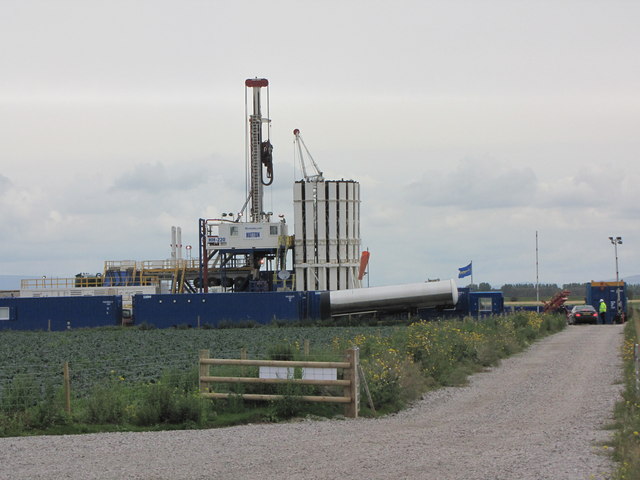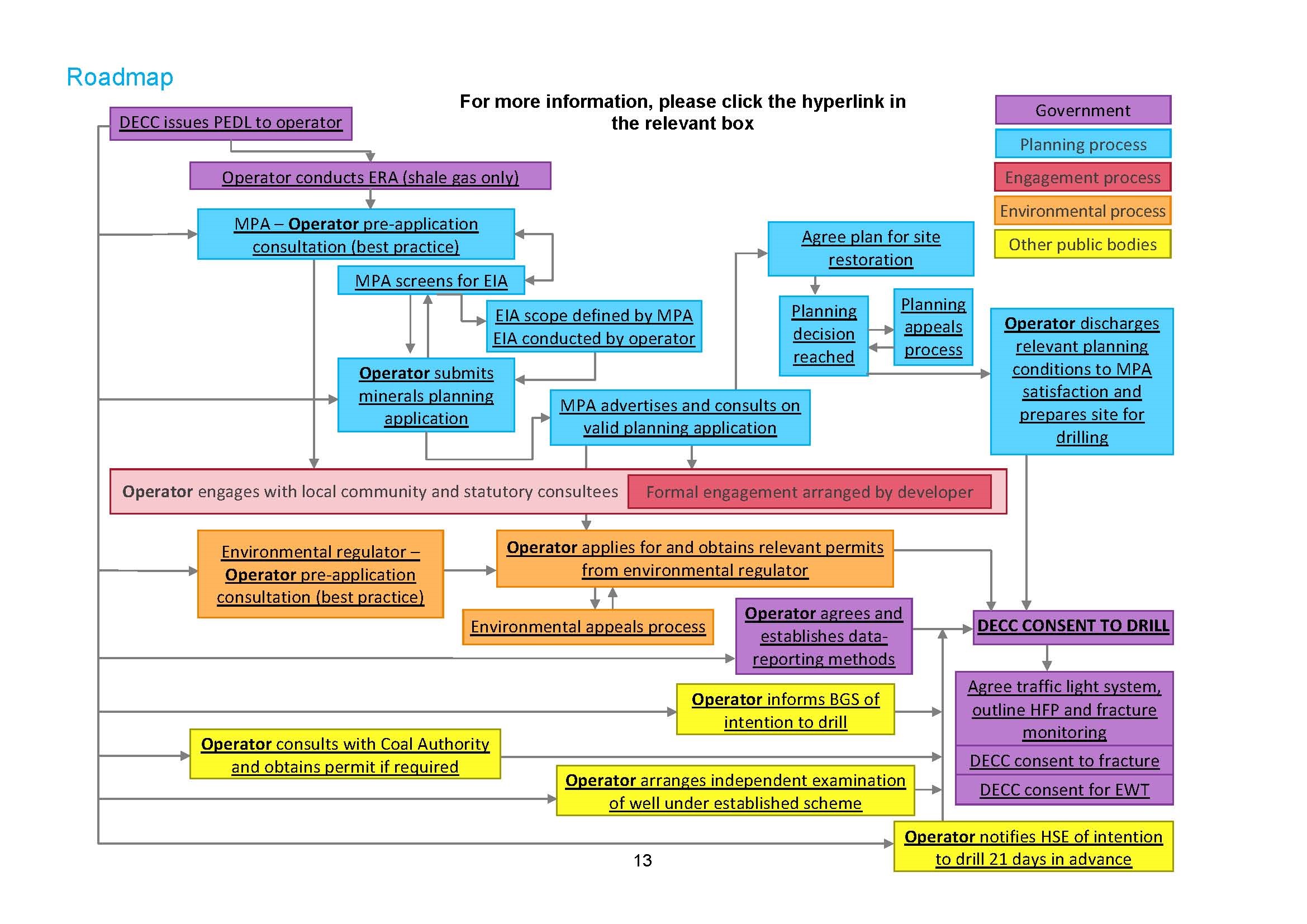The UK Government’s Infrastructure Act 2015 became law on the 12 February 2015. A controversial section of the Act that will apply in Wales concerns onshore shale gas exploration, through hydraulic fracturing or ‘fracking’. Once fully in force, the Act will allow operating companies access to shale gas beneath privately owned land. Shale gas wells are initially drilled vertically, usually to depths of at least 1.5 kilometres. Once the shale is reached drilling moves horizontally along the layer of rock in order to extract the maximum amount of gas. Horizontal drilling can extend to distances up to 3 km.
[caption id="attachment_3196" align="alignright" width="300"] Image from Geograph by KA. Licensed under the Creative Commons[/caption] Landowners currently have to give permission for drilling and fracking for shale gas beneath their property. The UK Government argued that the resulting legal process was costly and time consuming for shale gas companies. After the Act, at below depths of 300 metres and once a drilling licence has been issued, companies will not need permission from the landowner to drill or frack. In September 2014 the United Kingston Onshore Operators Group (UKOOG) welcomed the proposals:
Image from Geograph by KA. Licensed under the Creative Commons[/caption] Landowners currently have to give permission for drilling and fracking for shale gas beneath their property. The UK Government argued that the resulting legal process was costly and time consuming for shale gas companies. After the Act, at below depths of 300 metres and once a drilling licence has been issued, companies will not need permission from the landowner to drill or frack. In September 2014 the United Kingston Onshore Operators Group (UKOOG) welcomed the proposals:
The current system involves significant potential delays and costs without benefit either to the oil and gas industry or the landowner…Landowners on the surface will not notice this underground activity, it will have no impact on their day-to-day lives’
However, public consultation on the proposals found that 99% of respondents opposed legislation to provide underground access for fracking. Earlier this year following an agreement to devolve the licensing of fracking operations to the Scottish Government, a ‘moratorium’ on fracking consent in Scotland was announced. The House of Commons Environmental Audit Committee recently called for a ‘moratorium’ on fracking in the rest of the UK. This call was rejected during the final stages of the Bill’s passage through Parliament. However 13 Labour amendments were voted through, imposing a number of new restrictions on fracking operations. These included a ban on fracking ‘within and under’ protected areas such as national parks, Areas of Outstanding Natural Beauty and Sites of Special Scientific Interest. Late changes to these amendments in the House of Lords removed the term ‘under’ from the text, potentially allowing for fracking beneath a protected area as long as the well site is located outside its boundaries. Other late changes to the Labour amendments included the removal of mandatory Environmental Impact Assessments (although the environmental impact should still be considered), removal of the need to monitor emissions beyond methane and removal of the need to individually notify local people of fracking taking place in their area. The changes in the Infrastructure Act will introduce further complexities into the arrangements for consenting and permitting of fracking operations in Wales. The existing arrangements for Wales are already complex as the current guidance from DECC shows:  Licences for shale gas exploration and extraction are issued by DECC. However granting or refusing planning permission for such activities is devolved and Mineral Planning Authorities (MPAs – the Unitary Authorities or National Park Authorities in Wales) are responsible, although they should follow guidance issued by the Welsh Government. The Welsh Ministers can also take the decision-making away from the MPA by ‘calling-in’ a planning application. Environmental permitting is the responsibility of Natural Resources Wales (NRW). The safeguards in the new Act will apply to decisions made by the UK Government when issuing a ‘well consent’ to drill. The Act will require certain assurances from the MPA and from NRW before the UK Government can issue such a consent. This should mean that it is possible for either the local authority/Welsh Ministers or NRW to block a proposal for fracking in Wales if, for example, there are concerns about the environmental impact or about the substances to be used for the operation. Also drilling directly in protected areas will no longer be possible. Both the UK and Welsh Governments may decide to issue some further guidance on the practical implications of this new regime. On 4 February 2015 the Assembly voted in favour of a Plaid Cymru motion regretting the decision to allow fracking companies to drill beneath Welsh homes without permission from property owners. The motion also called for the full devolution of energy and on the Welsh Government “to do everything in its power to prevent fracking from taking place in Wales until it is proven to be safe in both an environmental and public health context.” On 13 February, Carl Sargeant issued a new ‘direction’ to MPAs requiring them to notify him of any planning application where unconventional extraction techniques such as fracking are proposed. This direction only applies if the MPA plans to approve the application and gives the Minister an opportunity to consider calling it in. It was reported in the media that the Minister had announced a ‘moratorium’, but the ‘direction’ itself does not prevent an application being approved and the MPA or Welsh Ministers could be the subject of legal challenge if a decision is taken to refuse an application that is not based on existing planning policies. There have been repeated calls for the Welsh Government to produce specific planning guidance on unconventional gas, but it has argued that its existing minerals planning policies provide adequate safeguards. The UK Government issued its own planning guidance for onshore oil and gas in England in July 2013.
Licences for shale gas exploration and extraction are issued by DECC. However granting or refusing planning permission for such activities is devolved and Mineral Planning Authorities (MPAs – the Unitary Authorities or National Park Authorities in Wales) are responsible, although they should follow guidance issued by the Welsh Government. The Welsh Ministers can also take the decision-making away from the MPA by ‘calling-in’ a planning application. Environmental permitting is the responsibility of Natural Resources Wales (NRW). The safeguards in the new Act will apply to decisions made by the UK Government when issuing a ‘well consent’ to drill. The Act will require certain assurances from the MPA and from NRW before the UK Government can issue such a consent. This should mean that it is possible for either the local authority/Welsh Ministers or NRW to block a proposal for fracking in Wales if, for example, there are concerns about the environmental impact or about the substances to be used for the operation. Also drilling directly in protected areas will no longer be possible. Both the UK and Welsh Governments may decide to issue some further guidance on the practical implications of this new regime. On 4 February 2015 the Assembly voted in favour of a Plaid Cymru motion regretting the decision to allow fracking companies to drill beneath Welsh homes without permission from property owners. The motion also called for the full devolution of energy and on the Welsh Government “to do everything in its power to prevent fracking from taking place in Wales until it is proven to be safe in both an environmental and public health context.” On 13 February, Carl Sargeant issued a new ‘direction’ to MPAs requiring them to notify him of any planning application where unconventional extraction techniques such as fracking are proposed. This direction only applies if the MPA plans to approve the application and gives the Minister an opportunity to consider calling it in. It was reported in the media that the Minister had announced a ‘moratorium’, but the ‘direction’ itself does not prevent an application being approved and the MPA or Welsh Ministers could be the subject of legal challenge if a decision is taken to refuse an application that is not based on existing planning policies. There have been repeated calls for the Welsh Government to produce specific planning guidance on unconventional gas, but it has argued that its existing minerals planning policies provide adequate safeguards. The UK Government issued its own planning guidance for onshore oil and gas in England in July 2013.
Article by Graham Winter and Harriet Howe, National Assembly for Wales Research Service.






